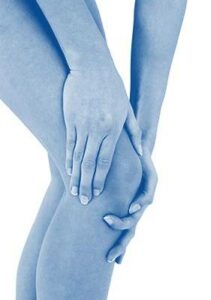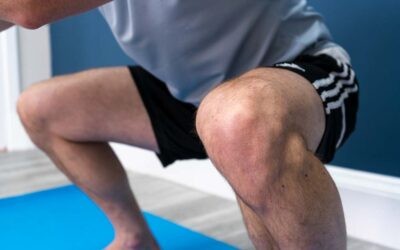Do knee’s really become more painful in the winter or is it just a myth?
Plus 6 Top Tips to Reduce Knee Pain this winter.
We have definitely left the long summer nights behind, autumn is coming to an end and winter is on its way. The cold, dark, damp weeks and months certainly appear to bring out more stiffness and aches in the joints, especially knees.
The question becomes, is there any science behind this or is it just an old wives tale?
If you’re in your late 50s or 60s there is a good chance you’ve already experienced something strange happening to your knee and other joints when the temperature begins to drop. Not to mention a feeling of how nice it is when you’re on holiday in the sunshine. They suddenly get that bit more annoying, nagging and painful on a daily basis almost in line with the clocks changing.
If you’re struggling to put your finger on it, you are not alone. The sensation that knee joints appear to become more stiff, ache more, click more and even swell more when the temperature drops is one that many men and women aged 50+ can hold their hand up to having suffered from.
There are many reasons why your knee joints appear to be more problematic. So let’s examine the two main culprits.
Number 1 on our list is the low temperature, which naturally restricts your circulation, and the fact that you’re much less likely to be active in the winter months, further restricting blood supply. Yet keeping joints mobile by being active is the equivalent of spraying WD40 on the stiff and rusty joints of an old car, it’s essential oil that makes the ride much easier and smoother.
Number 2 on our list is an observation that people commonly miss or fail to fully appreciate: the long winter months of inactivity can be the root cause of what I call ‘all of a sudden’ lifelong knee pains. Many people notice their physical capabilities deteriorate each year and put this simply down to “age related changes”. The is a self re-enforcing truth.
If you stop using your muscles and joints for 3-4 months every year, you will get weaker, you will get stiffer and it will be harder to gain that strength back through the summer months. It only takes 3 weeks to see muscles starting to lose their strength and decondition. It takes 12 to get them back to that baseline. It’s not fair but it is science. If the muscle wasting effect is significant enough then soon they won’t be able to support the joints the way they once did. They will have difficulty when you want to restart your previous activities in the spring. Joints will ache more when the get asked to do something they are not used to. Without the support of the muscles and regular exercise joints are much more likely to become arthritic.
Sedentary lifestyle is a much greater cause of arthritis than exercise is. In fact running has been shown to help prevent arthritic changes in the knee (yes even road running!). Weight gain, previous injury history and lack of exercise are the main causes of knee osteoarthritis and associated knee pain.
Here’s what really happens in the winter: after a long period of inactivity and hibernation, the temptation to automatically return to exercise again at your previous level is too strong especially when the weather improves. But the harsh reality is that after weeks of reduced activity you are just not strong enough to suddenly start exercising again safely after a prolonged period indoors.
The consequences of this is that most people’s health problems will be magnified and added to by a long winter break from activity. First you will experience a lull in your exercise and then you think it is ok to go back to do all the things you did before the winter started. So with that in mind, here is a tip to help you avoid making this mistake: seize every opportunity you have to be active over the winter months. Force yourself to be disciplined and continue to maintain your strength and mobility exercises, even when you don’t feel like it.
Another contributor to the increase in knee pain in the winter is a lack of Vitamin D. Living in Scotland has many advantages, but getting plenty sunlight in the winter is not one of them. Everyone associates Vitamin D with good health and understands its role in supporting the immune system. However it also has an important role in bone health and regulating our inflammatory system. As a consequence of shorter days, colder weather, wet and windy days, we spend more time indoors over the winter months. This reduces our intake of Vitamin D.
If you have any issues with joints, any inflammation, then this will appear worse. Now of course this is all linked to the colder temperatures, reduced blood flow, reduced exercise and reduced vitamin D, and it may not be the answer for everyone but when you understand why this is happening to you, it is easy to put a plan in place to combat all this.
Everyone (including children) should consider taking a daily supplement containing 10 micrograms (10µ) of vitamin D (400 IU), particularly during the winter months (October to March). It is specifically recommended that groups at higher risk of vitamin D deficiency take a daily supplement all year round.
So here are my 6 top tips for the winter and for reducing your knee pain specially in the winter is as follows.
- Keep your activity levels at the normal level. Regular exercise maintains strength and increases heart rate which improves your circulation.
- Heat will help. Try hot baths or a visit to a local sauna, great for your immune system and your knee pain.
- Keep your thigh muscles strong. You can’t go wrong getting strong and the stronger your thigh is the more support the knee joint will have. It’s also important to have mobility and strength in your hips and lower back, as they may be contributing to the problem but all things being equal the quadricep strength will give you the best return on your time.
- Top up with a vitamin D supplement (or move to sunnier climate in the winter!).
- Wear cushioned and well supported footwear. Often we change our footwear to suit the weather, but we still need to be giving our joints the care and attention they deserve. We can help of course with tailor made insoles if you need them.
- Avoid putting on too much weight over the winter, increased weight gain is a contributor towards knee pain and osteoarthritis.
If you are not sure where to start or want clarity that you are doing the right things then please just drop me an email or give us a call and we can help create a plan suitable for you.
Whether thats a physiotherapy appointment to get an accurate diagnosis and treatment plan, advice on how to keep your mobility and independence this winter, how to avoid a total knee replacement, or a nutritional analysis to help improve your health and well being then we are here for you.
You can take a look at our free injury advice info page or call the clinic on 0333 301 0205 to chat to someone about what you need.
https://optimalphysio.co.uk/knee-pain/
If you want to speak to a physio book a Fit For Physio appointment for a free face to face chat.



0 Comments